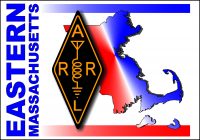I wanted to share this Request For Information from the ARRL Volunteer Resources Committee, via Steve Ewald at ARRL Hq. VRC feels that more cooperation is needed between ARES and NTS programs. They are looking for input from Section Managers, Section Traffic Managers and Section Emergency Coordinators as to how this might occur.
Additionally, I invite comments from any ARES or NTS participants.
73,
Phil Temples, K9HI
ARRL Section Manager,
Eastern Massachusetts Section
k9hi@arrl.orgARRL Section Managers,
The ARRL Volunteer Resources Committee has asked me to forward this letter to you.
Thank you very much for your help.
73,
Steve, WV1X
sewald@arrl.org
_______________
Dear Section Managers,
It has never been more important for the volunteers in ARRL’s
emergency communications programs to serve with professionalism and
excellence. During the past year, the Volunteer Resources Committee
has been studying the ARRL’s programs related to emergency
communications (see Minute 35, Board of Directors meeting, January
2002, March QST, page 64). This review was undertaken not only because
of the growing concern for homeland security following September 11,
2001, but also because of the ongoing need to ensure that Amateur
Radio responds effectively to disasters unrelated to terrorism —
floods, hurricanes, forest fires, earthquakes, hazardous materials
incidents, etc.
Several inter-related themes have emerged during the study. One is
that Amateur Radio must earn and maintain increased credibility with
served agencies, both nationally and at the local level. Another is
that Amateur Radio emergency communications volunteers must be more
actively involved in a variety of training experiences throughout the
year. Finally, although ARES and NTS are (and will continue to be)
structurally separate in your Section Field Organizations, these two
volunteer programs need to work more cooperatively, functioning as
part of one coherent emergency communications program at the Section
level.
The VRC believes that both ARES and NTS are valuable programs, and so
we will propose no structural change at the Section Level. We are
convinced that more cooperation is needed, however.
Some Sections have achieved a high degree of functional integration
and cooperation between ARES and NTS. In other Sections, each may
operate as though the other did not exist. The VRC believes that close
cooperation between ARES and NTS, with mutual respect and pooling of
expertise, is the best way to serve agencies effectively and to earn
credibility as fully-skilled emergency communicators.
The VRC will recommend that leadership officials in both ARES and NTS
be strongly encouraged to achieve certification in the ARRL’s
Emergency Communications certification program. We will also recommend
that grass-roots volunteers be encouraged to pass at least the Level 1
certification. Along with the many other benefits of certification,
ARES and NTS operators will gain better understanding of and
appreciation for the value of both programs.
The VRC requests all Section Managers (in consultation with your SEC’s
and STM’s) and the three NTS Area Staff Chairmen to develop a vision
of how a closer working relationship can be effected between ARES and
NTS.
Input from all Section Managers is needed, because Sections are very
different from one another.
1. If your Section has already brought ARES and NTS together quite
well, please describe how it is done, what problems may have arisen,
and how the problems were resolved. Your success stories will provide
ideas to other Section Managers.
2. If your Section’s ARES and NTS are functionally separate now,
you are asked to work with your SEC and STM to develop a plan for
bringing them into closer cooperation. Please describe your thought
process: what do you see as the major issues to be considered, the
important problems to be solved, and the major goals to be achieved?
Please post comments as soon as possible on the SM reflector. ARRL HQ
Staff will see that your input is relayed to the VRC, so it can be
considered as we prepare our report to the Board.
Thank you for working with us toward the goal of serving our
communities and our country to the best of Amateur Radio’s capability.
73,
The VRC

